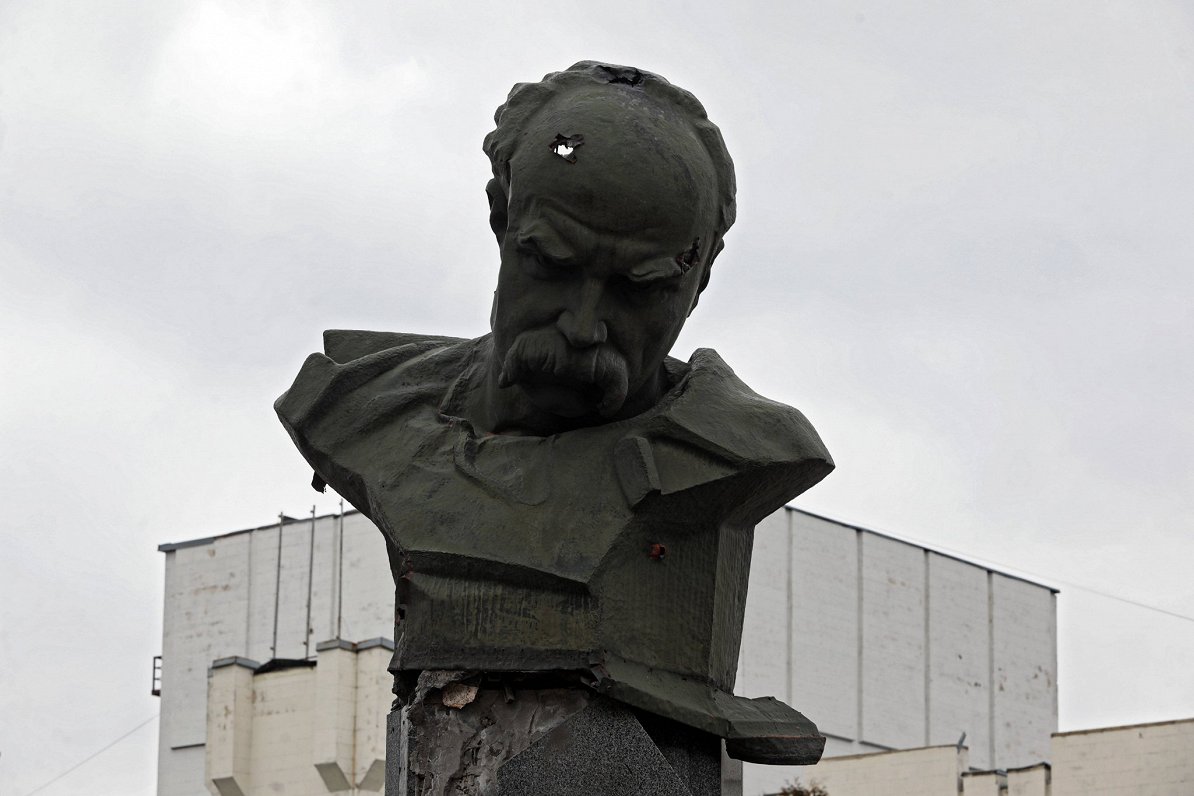The war is causing significant damage to Ukraine’s cultural heritage
–
–
Babinjara Holocaust Memorial in Kiev, 16th Century Orthodox Monastery and Cave Complex in Eastern Ukraine, Kharkiv Museum of Art, Mariupol Drama Theater…
These are just some of the sites in Ukraine that were damaged or destroyed in Russian airstrikes and shootings. The war is spreading not only against the people, but also against the culture.
This was also acknowledged by the President of Ukraine Volodymyr Zelensky: “Russian troops are deliberately killing civilians, destroying residential areas, attacking shelters and hospitals, schools and universities. Even churches, even Holocaust memorials! Russian troops are receiving exactly the same orders: destroy everything nation for nation, our nation for nation, our culture for culture. That is what the Nazis tried to occupy Europe 80 years ago. “
More than 70 historic sites, religious buildings and museums in Ukraine have been damaged, according to a UNESCO agency published in early April. This is what UNESCO experts have been able to summarize, but it is clear that the damage is much greater.
The Ukrainian Ministry of Culture reported that more than 170 crimes against Ukraine’s cultural heritage had been committed and 166 cultural monuments had already been destroyed or damaged. The damage was caused in Chernihiv, Kharkiv, Donetsk, Luhansk, Sumy, Kiev and many other places.
UNESCO heritage
Ukraine is home to seven UNESCO cultural heritage sites, including Kiev’s Hagia Sophia. True, so far none of them have suffered. UNESCO is trying to organize the placing of blue emblems on important buildings to signal that the site is a cultural heritage site.
Evidence is also being gathered to later prosecute those who destroyed or demolished the buildings.
Lazarus Elundu, director of the UNESCO World Heritage Center, explained: “Russia and Ukraine have signed an international instrument [1954. gada Hāgas konvenciju- red.]to protect cultural heritage in the event of conflict. If a building has this emblem and has suffered it, it means that those who have done so can be held accountable and can be considered a war crime in the future. “
The world’s most popular videos were from the western Ukrainian city of Lviv, where people were rushing to save the city’s culture from potential airstrikes.
However, the rescue of various cultural sites is also taking place in several other Ukrainian cities, including the capital, Kiev. Adhesive tape and other means are used to strengthen the padding, which covers various sculptures in many Ukrainian cities to protect them from the rubble caused by explosions. Sandbags are also widely used. Meanwhile, museums have taken the works to underground storage or moved them.
Ihori Poshivailo, director of the Maidan Museum in Ukraine, emphasized that the fight to preserve culture is very important, because culture helps Ukrainians not only to rediscover their past, but also to strengthen their identity.
“This war for cultural heritage identity means that the goal is not just territory or some military or civilian objects. The goal is our historical memory, our cultural traditions, our national and individual identity, our memories and identity as a nation,” he said.
Churches have also suffered as a result of the war, including some who were shot dead while civilians took refuge there.
Some of the Orthodox churches in Ukraine are under the auspices of Moscow, some under the auspices of Kiev. In Zaporizhia, for example, most Orthodox churches belong to the Moscow Patriarchate Church, while Bishop Foti and his Ukrainian Orthodox Church are in the minority in the city.
“Russia’s controlled regions are currently finding it very difficult and partly dangerous to carry out their duties. Our Ukrainian Orthodox Church, which is independent of Russia, is a kind of major ideological opponent of the Russian invaders,” said Bishop Foti.
Get rid of some
Some cultural objects are destroyed by people themselves.
For example, a monument to a Soviet tank was recently dismantled in the Transcarpathian region of Ukraine, and a monument to the Russian poet Alexander Pushkin was dismantled in Ternopil, western Ukraine. The mayor of the city, Serhiy Nadal, said that Pushkin, like most Russian writers and composers, had nothing to do with Ternopil, and after the atrocities committed by the Russian occupiers in Ukraine, there was no place for Russian or Soviet monuments in Ternopil.
CONTEXT:
On February 24, Russian President Vladimir Putin ordered to start Russian troops invade Ukraine. Putin claimed that NATO was going to use Ukraine as a bridgehead for aggression against Russia, although there was no evidence of these allegations. Ukraine believes that Putin’s real goal is to destroy Ukraine’s statehood and bring the territory under Moscow’s control.
Russia hoped to occupy Kiev and other major Ukrainian cities within a few days, but the Ukrainian armed forces showed fierce resistance to the occupiers and Russia has failed to meet its targets. Russian occupation forces continue to fire on Ukrainian cities, causing increasing civilian casualties.
In early April, the international community was shocked by news from the Kiev region of the city of Bucca, where Russian troops brutally retaliated against the civilian population. Ukrainian President Volodymyr Zelensky has described it as a war crime and genocide against the Ukrainian people.
More than 4.5 million refugees have fled Ukraine since the start of the war.
Russia’s aggression against Ukraine has provoked a general one condemnation of the international communityagainst Russia is new sanctions have been introduced. Many Western companies have decided to leave the Russian market.
–


